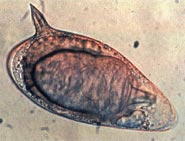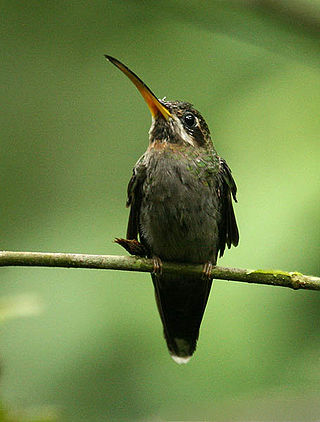
The bell pepper is the fruit of plants in the Grossum Group of the species Capsicum annuum. Cultivars of the plant produce fruits in different colors, including red, yellow, orange, green, white, chocolate, candy cane striped, and purple. Bell peppers are sometimes grouped with less pungent chili varieties as "sweet peppers". While they are botanically fruits—classified as berries—they are commonly used as a vegetable ingredient or side dish. Other varieties of the genus Capsicum are categorized as chili peppers when they are cultivated for their pungency, including some varieties of Capsicum annuum.

Hydrangeaceae is a family of flowering plants in the order Cornales, with a wide distribution in Asia and North America, and locally in southeastern Europe.
Fendlerbush may refer to:

Schistosoma is a genus of trematodes, commonly known as blood flukes. They are parasitic flatworms responsible for a highly significant group of infections in humans termed schistosomiasis, which is considered by the World Health Organization as the second-most socioeconomically devastating parasitic disease, with hundreds of millions infected worldwide.

Heinrich Wilhelm Schott was an Austrian botanist. He is known for his extensive work on aroids (Araceae).

Homarus is a genus of lobsters, which include the common and commercially significant species Homarus americanus and Homarus gammarus. The Cape lobster, which was formerly in this genus as H. capensis, was moved in 1995 to the new genus Homarinus.
Michel Félix Dunal was a French botanist. He was a professor of botany in Montpellier, France.

Slipper lobsters are a family (Scyllaridae) of about 90 species of achelate crustaceans, in the Decapoda clade Reptantia, found in all warm oceans and seas. They are not true lobsters, but are more closely related to spiny lobsters and furry lobsters. Slipper lobsters are instantly recognisable by their enlarged antennae, which project forward from the head as wide plates. All the species of slipper lobsters are edible, and some, such as the Moreton Bay bug and the Balmain bug are of commercial importance.

The Chamaemyiidae are a small family of acalyptrate flies with less than 200 species described worldwide. The larvae of these small flies are active and predatory and are often used for biological control of aphids, scale insects, and similar pests. Chamaemyiid fossils are poorly represented in amber deposits, but a few examples are known from the Eocene epoch onwards.

Menodora is a genus of perennial plants and shrubs in the olive family Oleaceae. Its 23 species are found in the temperate Americas and in southern Africa. These are uniform species of deserts and arid grasslands or savannas.
The weasel sharks are a family, the Hemigaleidae, of ground sharks found from the eastern Atlantic Ocean to the continental Indo-Pacific. They are found in shallow coastal waters to a depth of 100 m (330 ft).

The barbthroats are a genus Threnetes of South American hummingbirds in the family Trochilidae.

Chiloscyllium is a genus of sharks in the family Hemiscylliidae.

Toninia is a genus of lichen-forming fungi in the family Ramalinaceae.

The tribe Desmodieae is one of the subdivisions of the plant family Fabaceae. It is composed of two subtribes, Desmodiinae and Lespedezinae. Recent phylogenetics has this tribe nested within tribe Phaseoleae.

Quercus oblongifolia, commonly known as the Mexican blue oak, Arizona blue oak, Blue live oak or Sonoran blue oak, is an evergreen small tree or large shrub in the white oak group.

Justus Carl Hasskarl was a German explorer and botanist specializing in pteridophytes, bryophytes and spermatophytes.

Cercocarpus breviflorus, commonly known as desert mountain mahogany or hairy mountain mahogany, is a species of plant in the rose family, native to northern Mexico and the southwestern United States.

Ortygornis is a genus of birds in the francolin group of the family Phasianidae.

Ambleminae is a subfamily of freshwater mussel in the family Unionidae. They are found throughout much of eastern North America south to Central America, although fossils are also known from Siberia. Some species have also been introduced to East Asia. They are the most speciose radiation of the Unionidae, with more than 300 species.

















